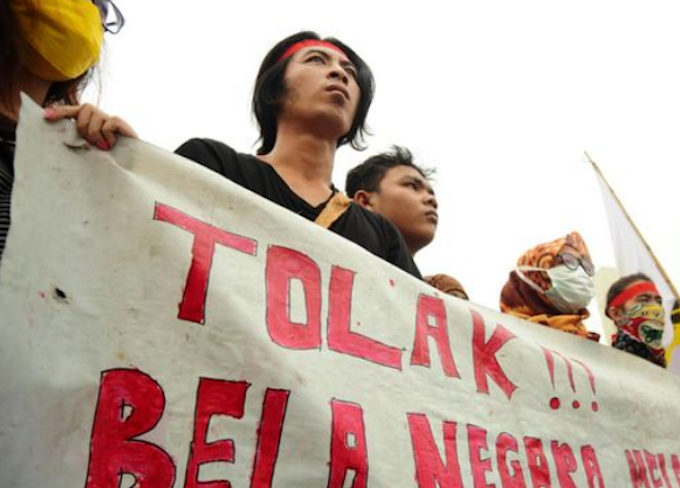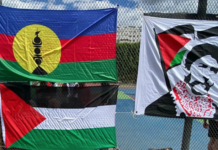
Pacific Media Centre Newsdesk
Indonesia’s West Papua province has again been recorded as having the worst democracy index in the republic, reports CNN Indonesia.
This year (2019), the West Papuan Democracy Index (IDI) was 57.62, even dropping lower from 2018 when it was 58.29 points.
Based on data from the National Statistics Agency (BPS), West Papua has the lowest score and is in last position – below South-East Sulawesi with a score of 65.21 points.
[Pacific Media Centre editor: West Papua in the Pacific is generally taken to mean the combined mainly Melanesian region of two provinces – Papua and West Papua.]
Following next is Papua province with a score of 62.25 points, North Sumatra with 67.65 points, West Sumatra with 67.69 points, Maluku with 68.22 points, West Java with 69.0 points and Jambi province with 69.76 points.
The BPS Democracy Index categorises the level of democracy as being good, moderate and poor. A Democracy Index score under 60 is classified as a poor democracy while a score of 60-80 represents a moderate democracy and a score above 80 is a good democracy.
Among all 32 provinces in Indonesia, West Papua was the only province with a poor Democracy Index.
BPS head Kecuk Suhariyanto said that there were seven provinces in Indonesia that were categorised as good.
Two provinces improve
“In 2018 there were only five provinces, in 2019 there are seven provinces with a category of good. From five there have been two additions making seven, namely Riau Islands and Central Kalimantan provinces,” he said during an online press conference.
Suhariyanto said Jakarta was the top rated province with a score of 88.29 points followed by North Kalimantan Utara with 83.45 points and Riau Islands with 81.64 points.
This is followed by Bali with 81.38 points, Central Kalimantan with 81.16 points, East Nusa Tenggara with 81,02 points and Yogyakarta Special Province with 80,67 points.
Nationally, Indonesia’s Democracy Index rose slightly to 74.92 in 2019. Last year in 2018 it was recorded at 72.39 points. As a whole, Indonesia’s democratic score is still categorised as moderate.
Nevertheless, looking at this in detail there are six indicators which still rated poorly in the index.
Namely threats of or the use of violence by the public which obstructs freedom of expression with a score of 57.35 points followed by the percentage of women elected as members of provincial parliaments (DPRD) with a score of 58.63 points.
This is followed by violent demonstrations or labour strikes with a score of 34.91 points, regional regulations imitated by DPRDs with a score of 46.16 points, DPRD recommendations to the executive with 16.70 points and finally efforts to provide budgetary information by regional government with a score of 53.43 points.
The Democracy Index is assessed based on three main aspects, namely civil freedoms, political rights and democratic institutions. Each of these three aspects has 11 variables and 28 indicators which are used to make an assessment.
Decline in civil freedoms
Although there was a 4.92 point increase in political rights and a 4.48 point increase in democratic institutions, there was a 1.26 decline in civil freedoms. The score for civil freedoms based on the IDI for this year stood at 77.20 points.
“The index for civil freedoms in 2019 was 77.20. A slight decline compared with the position in 2018 and its respective category is moderately [democratic]”, said Suhariyanto.
Civil freedoms were assessed using four variables with freedom of assembly and freedom of association scoring 78.03 points, a decline of 4,32 points compared with 2018.
Freedom of expression, which stood at 84.29 points, declined by 1.88 points, freedom of belief scored 83.03 points, rising by 0.17 points compared with 2018 and freedom from discrimination scored 92.35 points, rising by 0.58.
If looked at in detail, there was a step back in the indicators which covered threats of or the use of violence by government agencies which obstruct freedom of expression, assembly and association, and the threat of or use of violence by social organisations related to religious teachings.
Next, actions or statements by government officials which were discriminative in terms of gender, ethnicity or other vulnerable groups and or which restricted the freedom to worship.
Meanwhile improvements were found in the indicators covering the threat of or use of violence by the public which obstructed freedom of expression, assembly and association and or on the grounds of gender, ethnicity or other vulnerable groups.
Discriminatory regulations
There were also improvements in written regulations which restrict freedom of worship and religion and or which discriminate against gender, ethnicity or other vulnerable groups.
In the aspect of political rights, two variables were assessed. The breakdown was the right to vote and be elected which scored 79.27 points, rising by 3,5 points, public participation in decision making and government supervision which scored 56.72, rising 2.44 points.
Although this was still categorised as poor.
In terms of democratic institutions, five variables were assessed. The breakdown was free and fair elections which scored 85.75 points, declining by 9.73 points followed by the role of regional parliaments (DPRD) with a score of 61.74, a rise of 2.82 points.
Then the role of the political parties which scored 80.62 points, a decline of 1.48 points followed by the role of regional government bureaucracy which scored 62.58 points, a rise of 6.84 points and the role of an independent judiciary which scored 93.66 points, a rise of
2.94 points.
This abridged translation by James Balowski of IndoLeft News is based on two articles by CNN Indonesia published on August 3. The original title of the first article was “Indeks Demokrasi Papua Barat Paling Buruk, Jakarta Terbaik”. The title of the second article was “Kebebasan Sipil Turun, Indeks Demokrasi Indonesia Naik.”













































